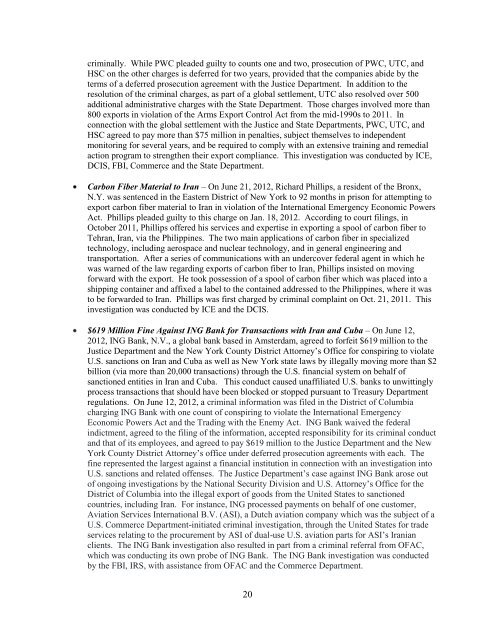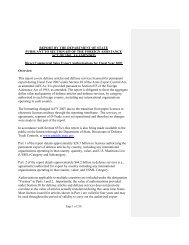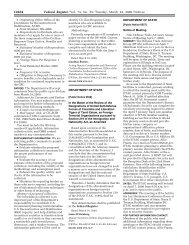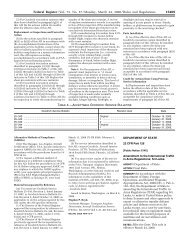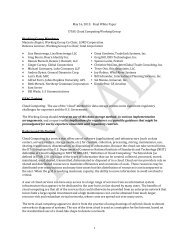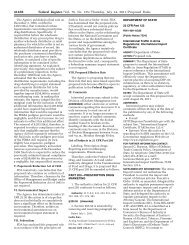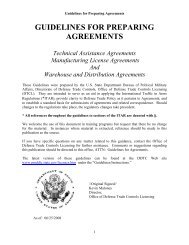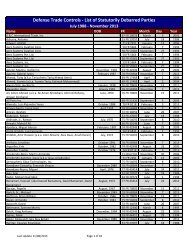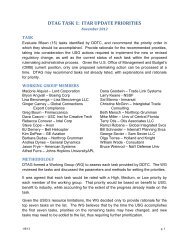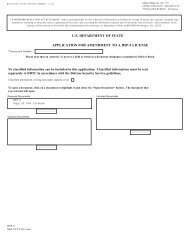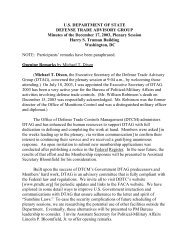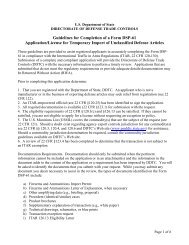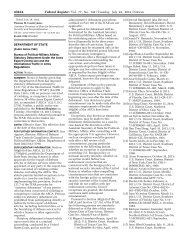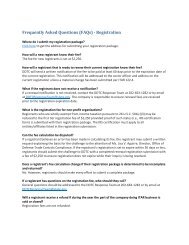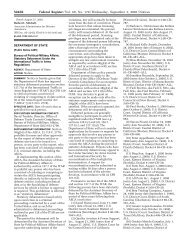Major Export Enforcement Cases - Directorate of Defense Trade ...
Major Export Enforcement Cases - Directorate of Defense Trade ...
Major Export Enforcement Cases - Directorate of Defense Trade ...
Create successful ePaper yourself
Turn your PDF publications into a flip-book with our unique Google optimized e-Paper software.
criminally. While PWC pleaded guilty to counts one and two, prosecution <strong>of</strong> PWC, UTC, and<br />
HSC on the other charges is deferred for two years, provided that the companies abide by the<br />
terms <strong>of</strong> a deferred prosecution agreement with the Justice Department. In addition to the<br />
resolution <strong>of</strong> the criminal charges, as part <strong>of</strong> a global settlement, UTC also resolved over 500<br />
additional administrative charges with the State Department. Those charges involved more than<br />
800 exports in violation <strong>of</strong> the Arms <strong>Export</strong> Control Act from the mid-1990s to 2011. In<br />
connection with the global settlement with the Justice and State Departments, PWC, UTC, and<br />
HSC agreed to pay more than $75 million in penalties, subject themselves to independent<br />
monitoring for several years, and be required to comply with an extensive training and remedial<br />
action program to strengthen their export compliance. This investigation was conducted by ICE,<br />
DCIS, FBI, Commerce and the State Department.<br />
Carbon Fiber Material to Iran – On June 21, 2012, Richard Phillips, a resident <strong>of</strong> the Bronx,<br />
N.Y. was sentenced in the Eastern District <strong>of</strong> New York to 92 months in prison for attempting to<br />
export carbon fiber material to Iran in violation <strong>of</strong> the International Emergency Economic Powers<br />
Act. Phillips pleaded guilty to this charge on Jan. 18, 2012. According to court filings, in<br />
October 2011, Phillips <strong>of</strong>fered his services and expertise in exporting a spool <strong>of</strong> carbon fiber to<br />
Tehran, Iran, via the Philippines. The two main applications <strong>of</strong> carbon fiber in specialized<br />
technology, including aerospace and nuclear technology, and in general engineering and<br />
transportation. After a series <strong>of</strong> communications with an undercover federal agent in which he<br />
was warned <strong>of</strong> the law regarding exports <strong>of</strong> carbon fiber to Iran, Phillips insisted on moving<br />
forward with the export. He took possession <strong>of</strong> a spool <strong>of</strong> carbon fiber which was placed into a<br />
shipping container and affixed a label to the contained addressed to the Philippines, where it was<br />
to be forwarded to Iran. Phillips was first charged by criminal complaint on Oct. 21, 2011. This<br />
investigation was conducted by ICE and the DCIS.<br />
$619 Million Fine Against ING Bank for Transactions with Iran and Cuba – On June 12,<br />
2012, ING Bank, N.V., a global bank based in Amsterdam, agreed to forfeit $619 million to the<br />
Justice Department and the New York County District Attorney’s Office for conspiring to violate<br />
U.S. sanctions on Iran and Cuba as well as New York state laws by illegally moving more than $2<br />
billion (via more than 20,000 transactions) through the U.S. financial system on behalf <strong>of</strong><br />
sanctioned entities in Iran and Cuba. This conduct caused unaffiliated U.S. banks to unwittingly<br />
process transactions that should have been blocked or stopped pursuant to Treasury Department<br />
regulations. On June 12, 2012, a criminal information was filed in the District <strong>of</strong> Columbia<br />
charging ING Bank with one count <strong>of</strong> conspiring to violate the International Emergency<br />
Economic Powers Act and the Trading with the Enemy Act. ING Bank waived the federal<br />
indictment, agreed to the filing <strong>of</strong> the information, accepted responsibility for its criminal conduct<br />
and that <strong>of</strong> its employees, and agreed to pay $619 million to the Justice Department and the New<br />
York County District Attorney’s <strong>of</strong>fice under deferred prosecution agreements with each. The<br />
fine represented the largest against a financial institution in connection with an investigation into<br />
U.S. sanctions and related <strong>of</strong>fenses. The Justice Department’s case against ING Bank arose out<br />
<strong>of</strong> ongoing investigations by the National Security Division and U.S. Attorney’s Office for the<br />
District <strong>of</strong> Columbia into the illegal export <strong>of</strong> goods from the United States to sanctioned<br />
countries, including Iran. For instance, ING processed payments on behalf <strong>of</strong> one customer,<br />
Aviation Services International B.V. (ASI), a Dutch aviation company which was the subject <strong>of</strong> a<br />
U.S. Commerce Department-initiated criminal investigation, through the United States for trade<br />
services relating to the procurement by ASI <strong>of</strong> dual-use U.S. aviation parts for ASI’s Iranian<br />
clients. The ING Bank investigation also resulted in part from a criminal referral from OFAC,<br />
which was conducting its own probe <strong>of</strong> ING Bank. The ING Bank investigation was conducted<br />
by the FBI, IRS, with assistance from OFAC and the Commerce Department.<br />
20


